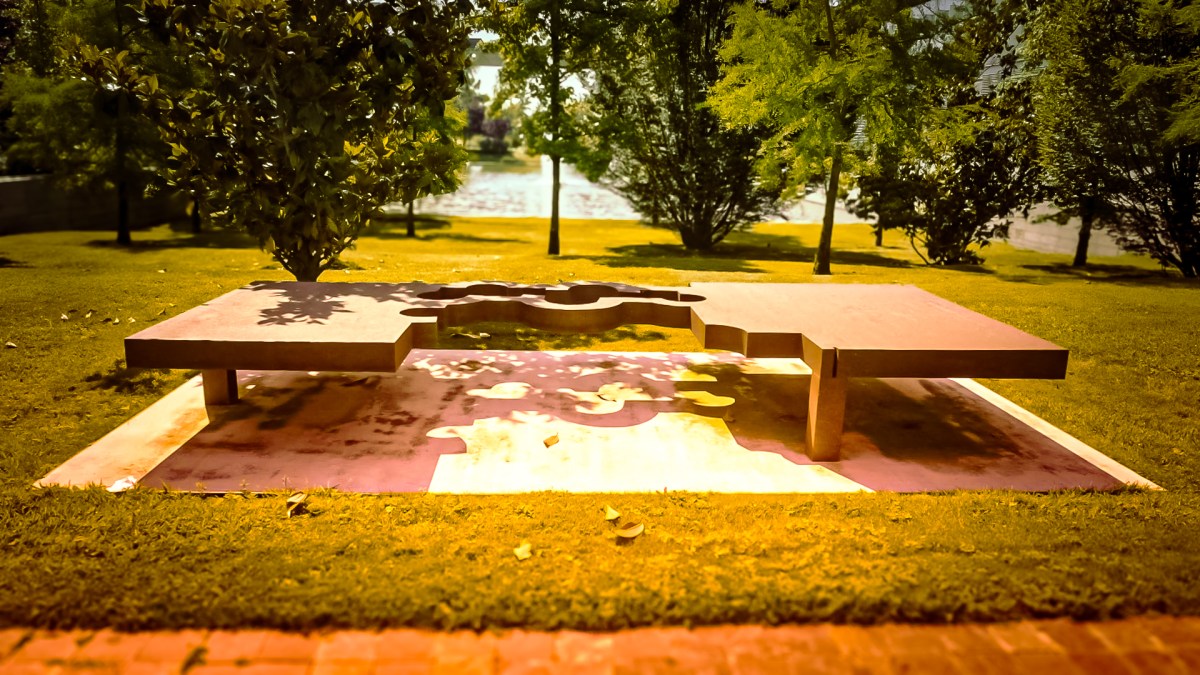This work is not only a testimony to Chillida’s creative genius, but also a manifestation of Telefónica’s commitment to art and culture since its foundation.
Biography
Eduardo Chillida (1924-2002), born in San Sebastian, is one of the most influential sculptors of the 20th century. Initially a promising football goalkeeper, Chillida abandoned his sporting career to devote himself fully to sculpture. His artistic career began in Paris, where he developed his distinctive style that explores the relationships between space, emptiness and materials such as iron, steel and concrete. Throughout his career, Chillida received numerous international awards and his works are exhibited in museums and public spaces all over the world.
His work in Telefónica District
‘Omar Khayyam IV Table’, created in 1983, is a steel sculpture that pays tribute to the Persian poet, mathematician and astronomer Omar Khayyam, known for his philosophical reflections and his quatrains. The choice of Khayyam as inspiration suggests a space of contemplation and meditation, inherent characteristics of the Persian thinker’s poetry. Chillida’s work, with its geometric and organic forms, invites interaction and deep thought, resonating with the modernity and innovative spirit of the Telefónica District.
Telefónica’s commitment to art
Since its creation in 1924, Telefónica has been a fervent supporter of art and culture. This commitment is manifested in the integration of important works of art in its headquarters and in its ongoing support for cultural initiatives through the Telefónica Foundation. The Foundation has played a crucial role in promoting art, organising exhibitions, workshops and events that encourage dialogue between technology and the humanities.
The presence of ‘Omar Khayyam IV’s Table’ in the Telefónica District is a perfect example of how the company fuses technology and art. This work, along with other sculptures by contemporary artists such as Jaume Plensa, whose recent addition to the Telefónica collection reinforces this vision, creates an environment where innovation and creativity can flourish together.
Other Telefónica artistic collaborations
Telefónica not only houses works by Chillida and Plensa, but has also collaborated with other prominent artists. Cristina Iglesias, for example, is known for her sculptures that integrate harmoniously with the architectural and natural environment, reflecting Chillida’s philosophy of spatial interaction. The work of other sculptors such as Pablo Serrano also adorns the Telefónica campus, adding to the artistic richness of the site.
In the field of architecture, the design of the Telefónica District, by Rafael de La-Hoz’s studio, is an example of how the built environment can complement and enhance the works of art it houses. De La-Hoz is known for his focus on functionality and aesthetics, creating spaces that promote interaction and inspiration.
In addition, the Telefónica District features works by contemporary photographers and painters. Photographer Ouka Leele, with her distinctive colourist vision, and painter Luis Feito, one of the founders of the El Paso group, are just a few examples of the artists who have collaborated with Telefónica, enriching its art collection and fostering a vibrant cultural environment.
Conclusions
Eduardo Chillida’s ‘Omar Khayyam IV Table’ in the Telefónica District is not only a work of art, but a symbol of Telefónica’s commitment to culture and art since its inception.
This space, where the legacy of a great sculptor meets technological innovation, reflects Telefónica’s vision that art and technology can coexist and enrich each other. Through its ongoing support for the arts and the integration of masterpieces into its environment, Telefónica continues to be a bridge between the past, present and future, promoting an enriching dialogue between creativity and innovation.
With a collection that includes sculptures by artists such as Jaume Plensa, Cristina Iglesias and Pablo Serrano, as well as the participation of architects such as Rafael de La-Hoz and the collaboration of photographers and painters such as Ouka Leele and Luis Feito, the Telefónica District stands as a true sanctuary of contemporary culture.
